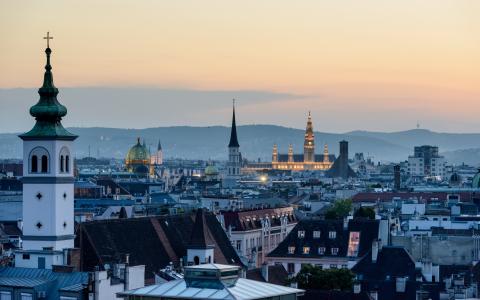
Heirs to the Austrian branch of the Rothschild banking dynasty have accused the city of Vienna of “perpetuating” Nazi aryanisation laws by plundering a long-forgotten charitable trust, set up in 1905 to endow the Austrian capital with pioneering psychiatric hospitals.
The case over the €110 million trust is one of the largest ever restitution claims contested by the descendants of Nazi victims — though it is highly unusual in that it is a dispute over charitable assets.
A lawsuit accuses the municipality of conspiring in recent years to sell valuable property from the Nathaniel Freiherr von Rothschild Foundation for the Mentally Ill to itself at grossly undervalued prices — including a late baroque palace that was one of the world’s earliest centres of mental health treatment — and amending the charity’s deeds to make the city the sole beneficiary of its assets.
The city is “completing what was done in 1938”, said Wulf Gordian Hauser, a lawyer representing the heirs, referring to the Nazi confiscation of the Austrian Rothschilds’ assets and bequests following the annexation of Austria by Germany.
Austria is no stranger to legal claims from the families of its once-thriving Jewish community, though it has so far been priceless cultural artefacts — such as Klimt’s portrait of Adele Bloch Bauer — that have been the subject of an often deeply uncomfortable reckoning with the country’s past.
The Rothschild families’ claim seeks to return control of the trust to its original form, and to repledge its assets “to the Austrian people” in perpetuity.
The case is about “the annihilation of [Nathaniel Rothschild’s] legacy,” the heirs said in a joint statement to the Financial Times. “We are determined to legally and morally challenge any attempt to further disrespect our great grand uncle and great-grandfather’s intentions and memory.”
Hannes Jarolim, the lawyer representing the city of Vienna, said a full rebuttal of the claims would be given in court.
“It is remarkable what arguments are being made about agreements with the Rothschild Foundation which were taken decades ago, and with the greatest respect and understanding of the original intentions of the foundation,” Jarolim added.
The case has been brought by Geoffrey Hoguet, the great-grandson of Albert von Rothschild, head of the Rothschild bank in Vienna in the twilight years of the Habsburg empire.
Hoguet, who lives in Manhattan, is a prominent investor and financial supporter of Democratic Party presidential nominee Pete Buttigieg.
Baron Albert von Rothschild set up the foundation in 1905 to commemorate his brother Nathaniel, the renowned art collector and a leading advocate of psychiatric treatments.
The bequest paid for the establishment of two institutions for cutting edge care for nervous disorders. A codicil to Albert’s own will later left the foundation with 20 million crowns — equivalent to around €120 million today.
Fin-de-siècle Vienna was a city whose intellectual and cultural elites were gripped by the developing field of psychiatry and an awareness of humanity’s psychological frailties. The year of the Rothschild foundation’s inauguration, 1905, also saw Freud publish his first work on sexuality. Despite such explorations, however, professional treatment was still all but unheard of, especially for huge numbers of Vienna’s exploding population of the urban poor.
Copies of the foundation’s charter, the will of Albert and its codicils, seen by the FT as part of the case, show the foundation was originally put under the protection of a board of 12 trustees, comprising nine nominees of the Rothschild family.
In 1938, the Nazi’s seized the trust, paid themselves a handsome share of its assets, and gave the rest to the Viennese government.
While the Trust was re-established in 1956 as part of Austria’s atonement for its embrace of Nazism, crucially, the scattered heirs of the Austrian Rothschilds were not told — city authorities deemed it too hard to find them — and the trusteeships passed to nominees of the city itself instead.
The trust’s unusual status went untroubled for decades. But recent years have seen Viennese authorities to try and rationalize their complex municipal structures into a more coherent system. Such a process has also coincided with a huge property price boom in the city — since the financial crisis, prices per square metre across the city have on average doubled.
In 2002, the city-appointed trustees sold one of the trust’s main assets, the Maria Theresien Schlössel — a small pleasure palace rumoured to have been favoured by empress Maria-Theresa — to the city. The Rothschild case claims it was massively undervalued.
When city authorities began cutting down swaths of trees on the sprawling campus of the Rosenhügel asylum last year, some prominent members of Vienna’s Jewish community who remembered the distant bequest of the Rothschild family, began to look more closely into the mayoralty’s activities.
They got in touch with Hoguet and his cousins. The heirs say Rosenhügel is being prepped for property development. If it is sold, then the trust will have lost its original purpose, and there will be a case to wind it up.
“[The City of Vienna] has essentially rewritten a will to make itself the main heir, and in effect, has done by guile what had been done in 1938 by brute force,” the heirs told the FT. “The city’s actions represent a grievous case of self-dealing, possibly the most cynical and corrupt in the history of aryanization and restitution in post war Austria.”
This article originally appeared on Windsor Star.



